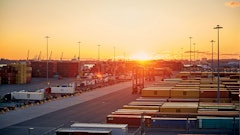
Today’s global governance landscape is currently undergoing a rapid rate of change, leaving many to speculate about how these changes will impact private sector sustainability investments. Uncertainty might drive decision making, but it does not change the facts: companies that invest in sustainability will continue to see benefits such as improved efficiency, creation of business value, and market access growth.
Simply put: a sustainable supply chain is an efficient, safe, and resilient supply chain.
Uncertainty can create hesitation, but the long-term economic and operational advantages of integrating sustainability into business far outweigh short-term policy changes. The latest Trade in Transition report from Economist Impact and DP World highlights that 71% of executives see non-aligned countries – countries that are not affiliated with any major power bloc, such as Mexico, Vietnam and the UAE – as key trade partners, signaling a need for diversification and strengthening supply chain resiliency.
Companies that offer opportunities for education, workforce development training, and programs that encourage women’s participation in the labor market are not only investing in potential future employees, but in building strong communities. It is easy to forget that sustainability is more than just calculating carbon emissions. Investment in societal well-being allows companies to remain competitive globally while providing benefits that reach far beyond the balance sheet.
Risk mitigation and supply chain stability
Sustainability investments play a critical role in protecting supply chains from disruptions caused by climate change and geopolitical risks. Extreme weather events such as hurricanes, flooding, and wildfires can cause major operational delays in global trade. In fact, the World Economic Forum estimates that climate-related supply chain disruptions could lead to net economic losses of up to $24.7 trillion by 2060, depending on carbon emission scenarios.
Furthermore, companies that proactively work to decarbonize their operations are better positioned to withstand global fossil fuel price shocks. Examples of investments include installation of solar power, deployment of electric terminal equipment, and use of renewable diesel. These measures reduce reliance on volatile fossil fuel markets and improve operational stability to keep global trade moving.
Sustainability as a competitive advantage
Far from being a burden, sustainability investments provide businesses with a competitive advantage in a rapidly evolving trade landscape while strengthening brand reputation and customer trust. According to a 2021 report from CDP, an independent environmental reporting entity, U.S. companies that fail to manage environmental risk up to a combined $120 billion in revenue losses by 2026. By contrast, businesses proactively integrating sustainability into their supply chains will maintain smoother trade operations and can reduce costs that impact operating profits by up to 60%, according to research conducted by McKinsey & Company.
Technological innovation can provide new sustainability benefits, such as efficiency gains and safety improvements. Companies that implement tools such as data-driven logistics decision-making, warehouse efficiency improvements, and operational planning software can improve productivity while reducing costs.
For instance, another DP World report found that nearly 60% of executives are using AI-powered analytics to consolidate shipments, shorten transportation distances and cut energy use in warehouses, creating a supply chain that is not only more efficient, but greener too.
Demonstrating value
A common question about sustainability in the freight industry is, “Who will pay?” Along with interest in generating business opportunities and commercial differentiation through the development of “green” products and services, this lens assumes that carbon is the only topic of importance in the logistics industry. While carbon is certainly a marker for cost and efficiency in the supply chain, as well as the focus of huge investments and technological developments, sustainability is a basket of diverse disciplines, most of which cannot be packaged into a commercial offering.
Changing this lens to demonstrate the value of sustainability will allow companies to create strategies that address the many facets of sustainability while driving change that is integrated across the business. This will also decouple sustainability from geopolitical uncertainty and strengthen the business case to maintain – or even expand – initiatives whose success cannot be easily recorded in traditional profit and loss calculations.
Moving toward resiliency
Even in the most committed of companies, sustainability traditionally exists as a function that operates as a complement to the core business, with strategies and reporting published separately from annual operational and financial statements. At the same time, repeated disruptions have demonstrated the need to improve global supply chain resiliency. What if sustainability is actually the answer to resiliency, and vice versa?
Remember: an efficient, safe and resilient supply chain is a sustainable supply chain. The measurements and vernacular may be different, but the outcomes are the same.



















